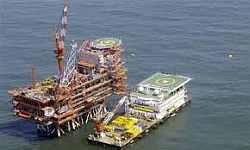Reliance Industries has sought tripling of its KG-D6 gas price from April 1, 2014 after the current below market rate of USD 4.205 per mmBtu expires. RIL on September 6 wrote to A Giridhar, Joint Secretary (Exploration) in the Ministry of Petroleum and Natural Gas proposing to price natural gas it produces from the Krishna Godavari basin block in Bay of Bengal at a rate equivalent to price India pays for importing liquefied natural gas (LNG).
RIL on September 6 wrote to A Giridhar, Joint Secretary (Exploration) in the Ministry of Petroleum and Natural Gas proposing to price natural gas it produces from the Krishna Godavari basin block in Bay of Bengal at a rate equivalent to price India pays for importing liquefied natural gas (LNG).
The company wants to price KG-D6 gas at 12.67 per cent of JCC, or Japan Customs --leared Crude, plus USD 0.26 per million British thermal unit. At USD 100 per barrel oil price, gas will cost USD 12.93 per mmBtu, sources with direct knowledge of the development said.
The formula proposed by RIL is the same at which Petronet LNG Ltd, the nation's largest liquefied natural gas importer, buys 7.5 million tonnes per annum (30 million standard cubic meters per day) of LNG from RasGas of Qatar.
RasGas charges 12.67 per cent of JCC and Petronet, which is headed by Oil Secretary, pays a further USD 0.26 per mmBtu for shipping the gas in its liquid form (LNG) from Qatar.
RIL said it needs to "achieve financial closure in order to undertake further development activities in the block. Therefore, it is once again requested that approval of the Government to the price formula as proposed... be conveyed to us without further delay."
The company said the price formula it has proposed would apply for all gas produced from KG-D6 block post March 2014.
Besides currently producing Dhirubhai-1 & 3 gas fields and MA oil field, the formula would also apply to D2, D6, D19 and D22 fields -- the field development plan of which has been approved by the government, it said.
The government had in 2007 fixed a price of USD 4.205 per mmBtu for gas from KG-D6 block for first five years of production. KG-D6 fields began production on April 1, 2009 and the current price expires on March 31, 2014.
From April 1, 2014,
Domestic oil producers like state-owned ONGC get import parity or a rate equivalent to international oil price, for the crude oil they produce from domestic fields.
"The proposed formula is in full compliance of the provisions of the Production Sharing Contract (PSC) that mandate that gas must be sold at arms-length prices to the benefit of the parites under the PSC," RIL President and COO B Ganguly wrote to the Oil Ministry.
"Imported LNG in the country constitutes about 35 per cent of gas consumption in the country and this share is expected to progressively increase. Hence long term LNG prices represent the best benchmark for arms-length prices," he added.
We respectfully submit that any effort to regulate gas prices to lower levels would be contrary to the provisions of
the PSC, the provisions of New Exploration Licensing Policy (NELP) as notified in 1999," RIL wrote.
The Empowered Group of Ministers (EGoM), which had fixed the USD 4.2 per mmBtu price, has also "stressed upon the need to maintain the sanctity of the PSC provisions."
RIL had in June first proposed the LNG-import parity pricing of gas. And the September 6 letter was a reminder.
Sources said the firm had submitted the pricing formula or basis a good 21 months before the new rates come into effect, so that the government has ample time to approve it.
This formula is different from the one that was approved in 2007. According to this formula, KG-D6 gas price was capped at crude oil price of USD 60 per barrel, translating into a sale price of USD 4.205 per mmBtu.
KG-D6 gas at USD 60 a barrel oil price, according to the new formula, would be priced at USD 7.862 per mmBtu.
Sources said KG-D6 output has plummeted about 27.5 mmscmd this month due to unexpected drop in reservoir pressure and increased water and sand ingress in wells. RIL believes fields outside currently producing ones can contribute 30-35 mmscmd to the output.










